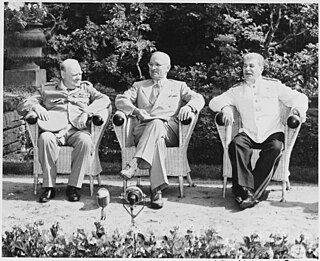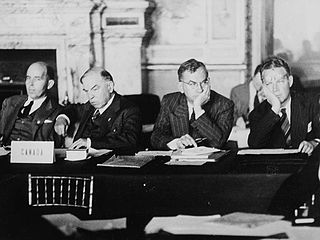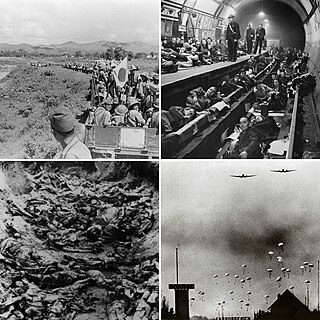
The Potsdam Conference was held at Potsdam in the Soviet occupation zone from July 17 to August 2, 1945, to allow the three leading Allies to plan the postwar peace, while avoiding the mistakes of the Paris Peace Conference of 1919. The participants were the Soviet Union, the United Kingdom, and the United States. They were represented respectively by General Secretary Joseph Stalin, Prime Ministers Winston Churchill and Clement Attlee, and President Harry S. Truman. They gathered to decide how to administer Germany, which had agreed to an unconditional surrender nine weeks earlier. The goals of the conference also included establishing the postwar order, solving issues on the peace treaty, and countering the effects of the war.

The Potsdam Agreement was the agreement between three of the Allies of World War II: the United Kingdom, the United States, and the Soviet Union after the war ended in Europe on 1 August 1945 and it was published the next day. A product of the Potsdam Conference, it concerned the military occupation and reconstruction of Germany, its border, and the entire European Theatre of War territory. It also addressed Germany's demilitarisation, reparations, the prosecution of war criminals and the mass expulsion of ethnic Germans from various parts of Europe. France was not invited to the conference but formally remained one of the powers occupying Germany.

The Romance languages, also known as the Latin or Neo-Latin languages, are the languages that are directly descended from Vulgar Latin. They are the only extant subgroup of the Italic branch of the Indo-European language family.

The Axis powers, originally called the Rome–Berlin Axis and also known as the Rome-Berlin-Tokyo Axis, was a military coalition that initiated World War II and fought against the Allies. Its principal members were Nazi Germany, the Kingdom of Italy, and the Empire of Japan. The Axis were united in their far-right positions and general opposition to the Allies, but otherwise lacked comparable coordination and ideological cohesion.

The Paris Peace Treaties were signed on 10 February 1947 following the end of World War II in 1945. The Paris Peace Conference lasted from 29 July until 15 October 1946. The victorious wartime Allied powers negotiated the details of peace treaties with those former Axis powers, namely Italy, Romania, Hungary, Bulgaria, and Finland, which had switched sides and declared war on Germany during the war. They were allowed to fully resume their responsibilities as sovereign states in international affairs and to qualify for membership in the United Nations. Nevertheless, the Paris Peace Treaties avoided taking into consideration the consequences of the Molotov–Ribbentrop Pact, officially known as the Treaty of Non-Aggression between Germany and the Union of Soviet Socialist Republics, whose secret clauses included the division of Poland between Nazi Germany and the Soviet Union, the occupation of the Baltic States, and the annexation of parts of Finland and Romania. The Molotov–Ribbentrop Pact changed the borders agreed after the Paris Peace Conference (1919–1920), and was signed on August 23, 1939. One week later, World War II started with Nazi Germany’s invasion of Poland, followed three weeks later by the Soviet invasion of Poland, which was completely erased from the map. In the following years, Nazi Germany and the Soviet Union changed the borders established by the peace treaties at the end of World War I.

The Latin Union is an international organization of nations that use Romance languages, whose activities have been suspended since 2012. Headquartered in Paris, France, it aims to protect, project, and promote the common cultural heritage of Romance peoples and unifying identities of the Romance, and Romance-influenced, world. It was created in 1954 in Madrid, Spain. It started to operate in 1983 and its membership rose from 12 to 36 states, including countries in North America, South America, Northern Europe, Southern Europe, Africa, and the Asia-Pacific region.
The year 1862 in science and technology involved some significant events, listed below.

The Beretta Model 1934 is an Italian compact, semi-automatic pistol which was issued as the service pistol of the Royal Italian Army beginning in 1934. As the standard sidearm of the Italian army it was issued to officers, NCOs and machine gun crews. It is chambered for the 9mm Corto, more commonly known as the .380 ACP.
This is a list of aviation-related events from 1910:
This is a list of aviation-related events from 1911:
Evenimentul Zilei is a formerly physical and now exclusively online newspaper in Romania. Its name means "The event of the day".

The Allies, or the Entente Powers, were an international military coalition of countries led by France, the United Kingdom, Russia, the United States, Italy, and Japan against the Central Powers of Germany, Austria-Hungary, the Ottoman Empire, and Bulgaria in World War I (1914–1918).

Norman Manea is a Romanian writer and author of short fiction, novels, and essays about the Holocaust, daily life in a communist state, and exile. He lives in the United States, where he is a Professor and writer in residence at Bard College.
Cotidianul is a Romanian-language newspaper published in Bucharest, Romania.

The Nieuport 10 is a French First World War sesquiplane that filled a wide variety of roles, including reconnaissance, fighter and trainer.

Psychologies is a monthly women's magazine dedicated to personal development and well-being, published by Rossel.

This is a timeline of World War II events that took place in 1940, the first full year of the second global war of the 20th century.

Clément Armand Fallières was a French statesman who was President of France from 1906 to 1913.
Events from the year 1924 in Romania. The year saw the first time that the country competed as a team in the Summer Olympic Games, and, although the country won no medals, Romania went on to enter every subsequent game apart from 1932 Summer Olympics.












